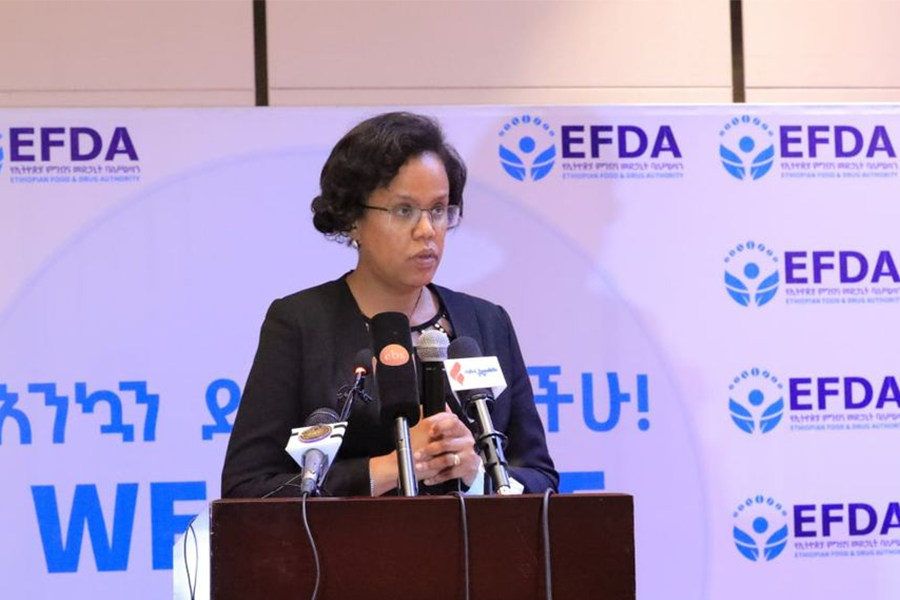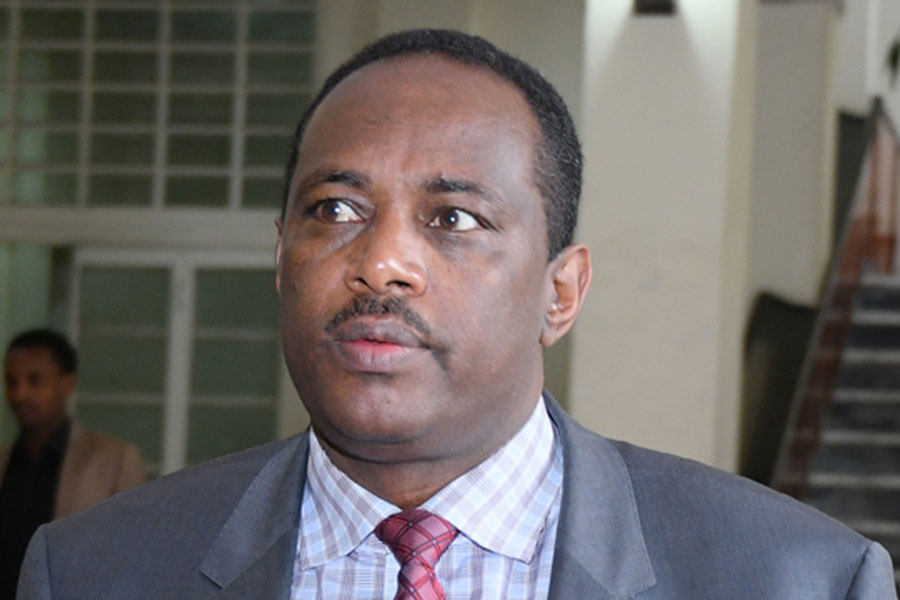
Fortune News | Oct 21,2024
Brook Taye (PhD), director general of the Ethiopian Capital Market Authority, has taken a step forward in establishing a regulatory foundation for the country's nascent capital market. Last week, his Authority introduced a comprehensive directive on licensing, operation, and supervision of securities exchanges, which he hoped would boost prospective investors' confidence and ensure market stability.
Last week's directive requires substantial financial commitment for exchange offices, with a paid-up capital of half a billion dollars. These offices are also demanded to maintain 20pc liquidity to cover operational costs, capital expenditures, and market risk exposure for up to a year. According to Brook, robust capital requirements are necessary due to the high investments needed in technology, infrastructure, and human resources.
"The regulatory framework has been developed based on international benchmarks to meet global standards," he said. "We expect the exchange team to come having fulfilled the requirements."
Licenses are categorised into securities exchange, derivatives, and over-the-counter (OTC) trading markets, each requiring a separate license. After a complete application is submitted, a 60-day window will determine if an exchange is granted a license to operate one or more types of markets under the Authority's regulation. Licensed exchanges are required to establish a comprehensive risk management framework.
The Director General stated the importance of building a robust financial infrastructure and addressing systemic risks to develop public trust through rigorous compliance and transparency.
"Investors have to be protected," he said, stressing the Authority's commitment to safeguarding investor interests.
Licensed securities exchanges are prohibited from executing orders against their capital or trading on their platforms. The law permits outsourcing certain services to third parties, excluding critical functions, provided the Exchange's accountability, management mandate, risk management, and service quality are not compromised. Recognised as self-regulatory organisations, exchanges must comply with the Authority's requirements.
Exchanges are required to be incorporated as share companies and meet specific operating requirements. The directive includes provisions for suspending and revoking licenses for breaches of contractual obligations, transgressions, or failure to fulfil duties the law requires. They will have to submit regular risk management and financial reports to the Authority, headquartered on Churchill Avenue. The directive also sets stringent criteria for selecting the board of directors and the CEO, focusing on academic qualifications, reputation, and experience to perform in the capital market.
The Ethiopian Securities Exchange (ESX) began its capital-raising activities last year, attracting interest from the private sector, including commercial banks and insurance companies. The seven-member board of directors, chaired by Hilaway Tadesse, now senior advisor to the Central Bank Governor Mamo Mehiretu, includes people like Eleni Gebremedhin (PhD), a founding and former CEO of Ethiopian Commodities Exchange (ECX), Zemedeneh Negatu, and Fikadu Petros. The ESX exceeded its initial capital requirement, raising a subscribed capital of 1.51 billion Br and a paid-up capital of 800 million Br.
State-owned enterprises that command the commanding heights of the economy, including Ethio telecom, Ethiopian Shipping & Logistics (ESL), and Ethiopian Insurance Corporation (EIC), as well as Birhana Selam Printing Enterprise (ESPE), are preparing for listing. Tilahun Kassahun (PhD), CEO of the Exchange, expects the domestic financial sector to play a crucial role.
"We had already prepared ourselves," he told Fortune.
He disclosed that the ESX is finalising requirements, forming implementation teams, and developing business plans, financial models, as well as risk management procedures.
The ESX has also partnered with the Information Network Security Agency (INSA) to ensure robust cybersecurity governance, security auditing, quality assurance, and legal compliance. Despite the domestic investors' league being dominated by 16 private commercial banks and 12 insurance firms, Tilahun dismissed concerns about concentrated risks, noting the distinct roles banks and insurance companies play in the market.
There are 17 institutional investors listed in the Exchange, where the federal government claims a major role, holding a 25pc stake, through the Ethiopian Investment Holdings (EIH), a sovereign fund managing a portfolio of state-owned companies valued at 38 billion dollars. State-owned enterprises under EIH have chipped in with 275 million Br subscription, with additional investments from FSD Africa, the Trade & Development Bank Group, and the Nigerian Exchange Group as foreign investors.
"It's well-balanced and diverse," said Tilahun.
Business leaders concur with his views. Ethiopian Insurers Association (EIA) leaders see an opportunity for insurance firms to become investment vehicles. Nyala Insurance, for instance, signed a deal for a 20 million Br share in the Exchange. According to its CEO, Yared Molla, it is important to list pioneer companies to create an attractive exchange market for others to join. Nyala Insurance plans to participate as an intermediary, with the listing requiring shareholders' approval to trade shares in the stock market, potentially beefing up its capital through higher profits and returns.
"We're exploring what we can gain from this," Yared told Fortune.
Ethiopian authorities have been working to establish a capital market for nearly five years. Initially started as a project team within the central bank, it has since evolved into an independent regulatory authority. Finance and investment consultants view the formulation of the law as a crucial milestone.
Mered Firkeyohannes, founder and CEO of Pragma Capital, lauded the directive, noting that hands-on regulation is essential for adequately overseeing the financial market and ensuring timely, credible and accurate information flow. According to Mered, the Exchange reflects the country's economy, primarily run by the state, with financial institutions expected to lead the way and other sectors following. He believes that the central bank's efforts to re-establish itself by formulating macroprudential policies to manage and regulate risks in the financial sector are positive developments.
According to Mered, public awareness of the capital market's broader role and understanding of investment opportunities and risks are critical for success.
"It's all based on business knowledge," he said, stating that Ethiopia's late entry into the stock market allows it to leverage evolving technology to operate within a robust, integrated system, learning from more advanced markets.
PUBLISHED ON
Jul 21,2024 [ VOL
25 , NO
1264]

Fortune News | Oct 21,2024

Radar | Apr 08,2024

Fortune News | Mar 19,2022

Radar | Aug 03,2025

Fortune News | Jun 15,2024

Dec 22 , 2024 . By TIZITA SHEWAFERAW
Charged with transforming colossal state-owned enterprises into modern and competitiv...

Aug 18 , 2024 . By AKSAH ITALO
Although predictable Yonas Zerihun's job in the ride-hailing service is not immune to...

Jul 28 , 2024 . By TIZITA SHEWAFERAW
Unhabitual, perhaps too many, Samuel Gebreyohannes, 38, used to occasionally enjoy a couple of beers at breakfast. However, he recently swit...

Jul 13 , 2024 . By AKSAH ITALO
Investors who rely on tractors, trucks, and field vehicles for commuting, transporting commodities, and f...

Nov 1 , 2025
The National Bank of Ethiopia (NBE) issued a statement two weeks ago that appeared to...

Oct 25 , 2025
The regulatory machinery is on overdrive. In only two years, no fewer than 35 new pro...

Oct 18 , 2025
The political establishment, notably the ruling party and its top brass, has become p...

Oct 11 , 2025
Ladislas Farago, a roving Associated Press (AP) correspondent, arrived in Ethiopia in...